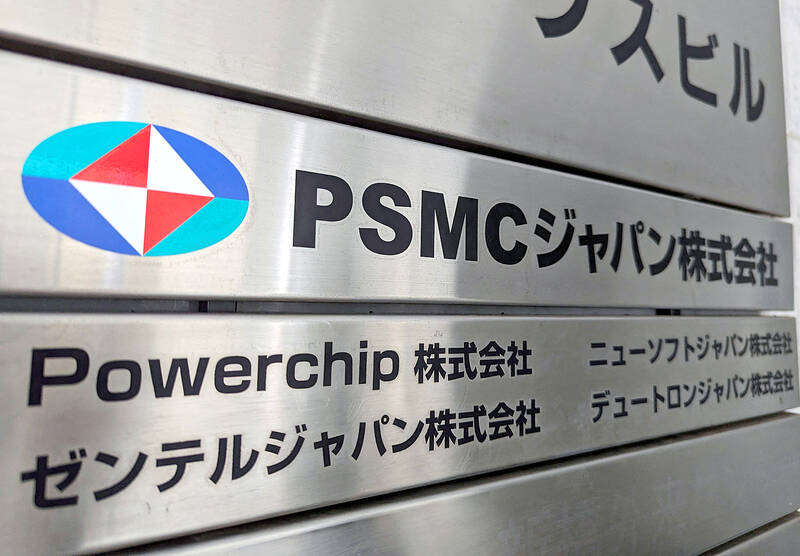Powerchip Semiconductor Manufacturing Corp (力積電) plans to build an ¥800 billion (US$5.3 billion) factory in northeast Japan with financing from investment group SBI Holdings Inc and the Japanese government, the latest boost to the nation’s bid to expand its chip manufacturing base.
The factory would require an initial investment of ¥420 billion, of which Powerchip and SBI would pay more than half, the firms said.
The rest would come from investors, bank loans and government subsidies, they said.

Photo: Reuters
The foundry, to be built in Miyagi Prefecture, is to produce mature 40-nanometer and 55-nanometer semiconductors, focusing on automotive chips and power controllers, and is to go online in 2027, the companies said.
Japan, home to Toyota Motor Corp and Honda Motor Co, is a heavy user of such chips, produced by the likes of Tokyo-based Renesas Electronics Corp.
“We’ve made preparations to create an unbeatable foundry and build a semiconductor ecosystem,” SBI chief executive officer Yoshitaka Kitao told a news conference yesterday.
SBI is to pay about ¥100 billion of the initial investment and seek another ¥100 billion through a new fund it plans to set up, but will not build a foundry without subsidies, Kitao said.
Japanese Prime Minister Fumio Kishida’s administration is paying billions of dollars in subsidies to chipmakers moving production to Japan.
Spurred by the financial support, Powerchip’s bigger rival and industry leader Taiwan Semiconductor Manufacturing Co (台積電) is building a factory in southern Japan, with operations expected to begin next year.
US memorychip maker Micron Technology Inc, and domestic players Kioxia Holdings Corp and Rapidus Corp are also expanding production in the world’s third-largest economy, helped by government support.
“The automotive chips that Powerchip will focus on are precisely the kind of chips used in vehicles today and will help secure this production base,” Japanese Minister of Economy, Trade and Industry Yasutoshi Nishimura said at a regular news conference ahead of the investment announcement.
“We want to secure the supplementary budget necessary to strengthen our semiconductor supply chain,” Nishimura added.
Japan, which wants to claw back its former leadership in chips, is benefiting from a shift in global supply chains as manufacturers seek to lower reliance on Taiwan and hedge against rising US-China tensions.
Washington is also offering incentives to chipmakers building capacity in the US, but progress has been slow.
Japan is “the best place” for semiconductor investment, Powerchip chairman Frank Huang (黃崇仁) said.
With so much capacity coming online in Japan, it remains unclear how companies would be able to secure enough engineering talent, given a weak yen.
Powerchip’s move comes as the chip sector fights to regain its footing from a sharp drop in demand following the COVID-19 pandemic.
The Taiwanese contract chipmaker had a tough first half, with little profit due to weak sales.
It reportedly told investors in July that it would be conservative with capacity expansion going forward.

Sweeping policy changes under US Secretary of Health and Human Services Robert F. Kennedy Jr are having a chilling effect on vaccine makers as anti-vaccine rhetoric has turned into concrete changes in inoculation schedules and recommendations, investors and executives said. The administration of US President Donald Trump has in the past year upended vaccine recommendations, with the country last month ending its longstanding guidance that all children receive inoculations against flu, hepatitis A and other diseases. The unprecedented changes have led to diminished vaccine usage, hurt the investment case for some biotechs, and created a drag that would likely dent revenues and

Macronix International Co (旺宏), the world’s biggest NOR flash memory supplier, yesterday said it would spend NT$22 billion (US$699.1 million) on capacity expansion this year to increase its production of mid-to-low-density memory chips as the world’s major memorychip suppliers are phasing out the market. The company said its planned capital expenditures are about 11 times higher than the NT$1.8 billion it spent on new facilities and equipment last year. A majority of this year’s outlay would be allocated to step up capacity of multi-level cell (MLC) NAND flash memory chips, which are used in embedded multimedia cards (eMMC), a managed

CULPRITS: Factors that affected the slip included falling global crude oil prices, wait-and-see consumer attitudes due to US tariffs and a different Lunar New Year holiday schedule Taiwan’s retail sales ended a nine-year growth streak last year, slipping 0.2 percent from a year earlier as uncertainty over US tariff policies affected demand for durable goods, data released on Friday by the Ministry of Economic Affairs showed. Last year’s retail sales totaled NT$4.84 trillion (US$153.27 billion), down about NT$9.5 billion, or 0.2 percent, from 2024. Despite the decline, the figure was still the second-highest annual sales total on record. Ministry statistics department deputy head Chen Yu-fang (陳玉芳) said sales of cars, motorcycles and related products, which accounted for 17.4 percent of total retail rales last year, fell NT$68.1 billion, or

In the wake of strong global demand for AI applications, Taiwan’s export-oriented economy accelerated with the composite index of economic indicators flashing the first “red” light in December for one year, indicating the economy is in booming mode, the National Development Council (NDC) said yesterday. Moreover, the index of leading indicators, which gauges the potential state of the economy over the next six months, also moved higher in December amid growing optimism over the outlook, the NDC said. In December, the index of economic indicators rose one point from a month earlier to 38, at the lower end of the “red” light.